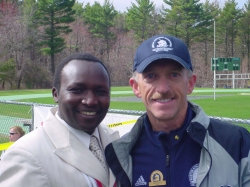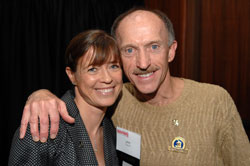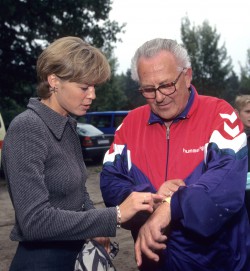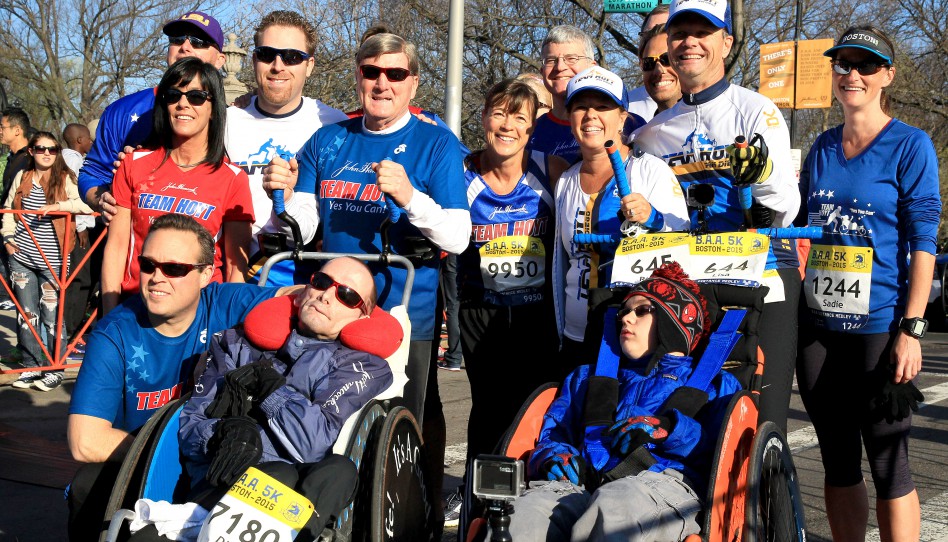“We Confuse Success with Victory”: A Conversation with Jack Fultz

Perhaps best known for winning the 1976 Boston Marathon, Jack Fultz is an amazingly diverse person. Among his current undertakings: teaching sport psychology at Tufts University; providing personal coaching services; giving instructional and motivational speeches; and serving as the advisor to the Dana-Farber Marathon Challenge, which has raised $30 million for cancer research since Jack became involved with it in 1990.
Still visibly and highly fit at age 58, Jack made running history when he won the 1976 Boston Marathon, the legendary “run for the hoses,” during which temperatures topped 100 degrees. As Jack relates below, one of the other highlights of his long elite running career was placing 4th at the 1978 Boston Marathon in a personal best of 2:11:17. Although he doesn’t run marathons these days, Jack maintains a fondness for endurance events; for example, he has ridden the Pan-Massachusetts Challenge, a two-day fundraising cycling event, every year since 2003.
Jack also has a strong connection to Take The Magic Step®. He helped Uta before her first Boston Marathon, in 1990, and he was instrumental in establishing Uta’s ongoing relationship with the Dana-Farber Cancer Institute.
Take The Magic Step® team member Scott Douglas talked with Jack in Concord, Massachusetts, near Fultz’s home in Lincoln.
What’s a typical week like for you these days in terms of activity?
Jack Fultz: There probably isn’t a typical week for me, which is a real blessing. I do a lot of personal training with individual clients and, weather permitting, I do a lot of biking to client sites. I use that as a way of commuting and getting in a workout as well. In the winter, my activity moves indoors a lot, although even in the summer I’m still indoors to some extent―I go to the health club because I do some running programs out of several health clubs in the areas. While there I do a good amount of stretching.
One my passions in terms of activity is golf, which might hardly seem like a fitness sport, but it still requires that you maintain some flexibility and sharpness and quickness. When I’m hitting the ball well, I feel like that’s a real athletic move.
With golf, from a mental standpoint, I get what racing provided through a better part of my running career, which was the opportunity to improve if you work harder. In running, at some point you have to use the age-graded tables to see if you’re still improving, because your times start slowing down. But something new like golf, I’m still on the up cycle, so that’s inspiring. It’s also inspiring because there’s a method to the madness in how you structure things to improve. You have to be disciplined. You can’t just go out and play once a week and expect to really improve. I try to bring in the mindset I had in training for marathons, where to really get better you have to do it all the time.
Do you run at all?
Jack: Almost none. I have arthritis in my hip. If my hip were fine, I could train, I could still run in age-group races. To be honest with you, nothing has replaced what running was to me. Nothing has given me that same charge, that same high.
To really return to racing, a hip replacement would be required. The arthritis, it’s there, I feel it pretty much every day to varying degrees. I keep stretching to maintain the integrity of the joint. I have a feeling at some point I’ll have to get it replaced. But it’s not too bad yet―I can still walk 18 holes of golf, I can bike without any problem, and swimming is another activity I do a lot of it, and it’s very forgiving to the body.
Have you been told that the arthritis is related to running?
Jack: There’s always speculation about what caused it. Of course, most people with arthritis never ran, and other people run their entire lives and never have arthritic conditions. Some experts will tell you that running in no way causes arthritis. In my case, I grew up delivering newspapers with one big bag of newspapers on my left shoulder. So if you stand and look at my physique, you can see the effects of that―my left shoulder rides considerably higher. My hips are rotated by virtue of that, and my right leg has always been a little shorter. There was a period when one of the shoe companies I was with made me a shoe with a thicker midsole on the one shoe. Throughout my career I tried to work on strength and flexibility and trying to run as symmetrically as I could. I believe that imbalance led to a lot of the injuries I had on my right side, hamstring problems and whatnot, and slowly over time there was enough wear there. I ran my first marathon in 1971, and my last in 2000, so that’s a pretty good ride.
Certainly because of my work, I wouldn’t let myself get out of shape, but I probably do more than I need to do just to stay in shape and stay healthy. I still get a good buzz from a good hard workout; the adrenaline rush is great. But not everyone is like that―I know guys who ran 2:11 marathons back when I did and are now 50 pounds heavier.
I’ve never understood how you can know what it feels like to be that fit and then just say, “Never mind―I’m not going to spend half an hour five days a week to stay in shape.”
Jack: Yeah, it baffles me, too. At some point I would think their running would have become about more than just competing, that there would be that appeal of an active lifestyle, of being healthy and fit. Not that you have to run 100 miles per week―in fact, it’s arguable whether training for a marathon at a high, high level is entirely healthful. But that’s not what we’re talking about here―we’re talking about a moderate level of regular activity. For me, maintaining a healthy, active lifestyle has always been a part of who I am. I look at the guys I raced against and it’s hard to imagine that it’s that much different for them, that they wouldn’t want to slow down to a lighter level of activity but still maintain some fitness. But then there are people like me who have held on to that desire to be fit―look at someone like Bill Rodgers, or someone like [KIMbia manager] Tom Ratcliffe, 2:14 marathon at his best. I think if he never raced again he would still want to run every day, because it’s a part of who he is.
Yeah, it’s always intrigued me how some people, without the competitive thing driving them, never found anything else about it that’s appealing enough to want to keep doing it. Tom, for example, just loves going out and running on trails.
Jack: When I moved here in 1979, most of the guys were living in town, in Boston, but I was out here in Concord, and discovered for myself the trails around Walden Pond. In that setting my runs became almost a meditation, so I was fortunate to have that part of it cultivated.
Before Boston this year I was on a Runner’s World panel, and [1983 Boston Marathon champ] Greg Meyer was talking about how the need to win was what drove him. The thing that drove me in my competitive career, and that turned me toward sport psychology, was curiosity about the limiting factors: Were they mostly physical, or were they mostly mental? I was pretty convinced they were mostly mental for most athletes. So in the competitive arena, my objective was acquiring self knowledge―I wanted to see how good I could get. That meant finding meaning outside of the structure of a competitive event, which pits one against the other, and so the measure of our performance is relative to how the other people are doing. In that structure, to win a race, you don’t necessarily have to do your best―to win a race, you simply have to do better than everyone else. That’s the way we set up our games, even our society, and I understand, but there’s a corrosive effect to pursuing the activity with that as the primary or sole objective all the time.
That’s true for lots of reasons, not the least of which is that no one wins all the time, and most people don’t win much of the time. So if that’s the driving force, it can undermine the intrinsic aspect of the activity. And maybe that was the driving force for the guys we talked about earlier―for them, it was just about the competition, and they’d either win or die trying, and once they got to a point where they knew they couldn’t win anymore, they just gave it up. Because the intrinsic value of the activity had been corroded, there was no joy left in the activity.
When you look at some of the great coaches―Vince Lombardi, John Wooten, people who had dynasties―they didn’t talk that much about beating the other team per se. They talked about ideal preparation, ideal execution, and the outcome was a byproduct of playing the perfect game. Even Vince Lombardi, who was attributed with saying, “Winning isn’t everything, it’s the only thing,” later retracted that statement, and said, “Winning isn’t everything, but the will to win is.” The will to win has to do with preparing yourself to the best of your ability and going out and being smart about your approach and doing everything you can to make sure at the end of the game or race that you’ve left nothing out there, that you’ve given it your best shot. And then the outcome is going to be what it’s going to be.
So then if you had to pick, would you be more satisfied with Boston ’76 or Boston ’78?
Jack: For me, they are equally satisfying. I probably got more out of myself in ’78, because I had to run hard all the way to the finish. In ’76, I took the lead at 18 miles and just continued to run―everyone was behind me, and I just sort of enjoyed the parade. For a moment my calf cramped at mile 22 and there was a brief thought, “Oh my God, if I start to crumble now somebody’s going to catch me.” And then my next thought was, “Well, if so, this is the best race of my life so far, and I’ll be back here again. So if that happens, it happens, and there’s nothing I can do about it. I’ll live with that and come back to fight another day.” And just that notion was enough to enable me to slow down a little bit, get my composure back, and my calf relaxed enough to let me continue on the last few miles. Now, if I had been so driven by the need to win and now I had victory in my grasp and refused to let go, that could very well have been my demise.
Now what’s really interesting is if you see how the traditional view toward competition shows up in youth athletics, where people cultivate their approach to competition. If you haven’t been able to do something to nurture the intrinsic motivation toward the things you’re going to do later in life, it ends up being a dead end, because you’re not always going to win, and so you’re going to be continually frustrated, and you’ll probably give it up eventually.
How much have you in hindsight applied this sort of thinking to how you were then, versus how much did you consciously try to think that way then?
Jack: I think that what I learned afterward confirmed what I felt going on, but I didn’t always articulate it in the way I do now. When I started studying sport psychology, I looked at the stories of coaches and athletes who had experiences similar to mine and articulated it well.
Timothy Galloway, in his book “The Inner Game of Tennis,” with its concept of the inner game, is very much about that. He was captain of the tennis team at Harvard, and tried to play at the pro level. He saw the corrosive aspects of competition, especially in tennis, with tennis brats and their parents living vicariously through them and paying big bucks to train their kids, hoping that they get a college scholarship or make it on the pro tour. There’s a lot of elitism at the higher levels of tennis, and he saw a lot of that, of people being destroyed by the competitiveness and becoming their own worst enemy. And he saw the threat of competition, where kids get sick to their stomachs with fear, and how that drains all the enjoyment out of it, and how that’s a dead-end road.
He discovered that only when you’re playing an egoless tennis―or maybe it’s running an egoless race―can you have a true peak experience, where you really only appreciate it after the fact, because in the midst of it you’re so much in the present that you’re not conscious of it.
Those illustrious moments don’t happen often enough in life. I knew that happened for me at Boston in ’76. It happens for all of us some training runs, where you go out and you come back and you think, “Wow, what just happened? The time flew!” When you’re doing it and you’re truly in the present, time does take on a bit of a different dimension, and you’re free to do things that you can’t recreate when you realize how special it was. That’s because then your ego is trying to do it, and your conscious mind is trying to impose itself on the situation, and it ends up getting in the way.
I’m reading a book called “Fearless Golf” by Gio Valiante. He illustrates Jack Nicklaus’s approach to golf. To him, it was never about playing the other guys in the tournament. It was him against the golf course, and him against his old limitations. And so that set up a totally different structure. What creates the worst competition anxiety for most people is the other athletes, worrying that someone’s going to beat you and steal your thunder and cause you to embarrass yourself. If you can let go of that fear, you’re free now to get out of yourself what you’ve put in during your preparation. It’s like having money in the bank, but your ATM card is broken, so you can’t get anything out. It’s there, it’s yours to use, but when you can’t get it out, it’s even more frustrating. To have a performance that doesn’t live up to the fitness you know you have from all the hard work you did… I would argue that the majority of runners experience that the majority of the time. I think there’s a better approach, one that would more often optimize your performance.
Timothy Galloway talks about that, that the ego wants to impose itself on the action and dictate the terms under which we’re doing it. But it’s the subconscious mind that really knows how to do what we want our body to do, so if we can get the conscious mind out of the way and free ourselves to do it, we’re more likely to have one of those peak performances. In retrospect, every time I look back at those few peak experiences, that’s what my race was about.
Are there things about preparation and goal setting that you learned from your subsequent studies that you wished you had known earlier? Or was this another case where you were sort of intuitively doing the right thing?
Jack: Looking back, I realize that I had a good sense of what I needed to do in terms of preparing for a major competition. One thing I could have done a lot more effectively if I had studied it was goal setting. With hindsight, I see that I would start with a dream goal. That’s a dream beyond what you think you might be able to do. Winning Boston was sort of like that―I never really knew that I could, but we would all dream about that, just like little kids playing baseball think about playing in the Major Leagues. So a dream goal, you hold that out there, keeping it viable to yourself.
From there, you work backwards to something you think might be attainable given some particular time frame. And then you continue to work backwards from there to the point where you know very specifically what you need to do today and tomorrow that will lead to accomplishing those longer-term goals.
I could have benefited from tightening up that structure. I still did too much of what I would call “ad hoc training,” where I’d go whatever way the wind was blowing. In training, I think I was my own worst enemy, because I simply drew a straight line between how hard I would train and how effectively I might be able to race, and I think I overtrained many times and went into too many races too tired and unable to make the withdrawal we were talking about earlier. I would think after the race, “That’s not me―I’m much fitter than that. I had that great workout earlier in the week.” In fact, I’d probably left my race in that workout. With more effective goal setting, I would have been more confident and would have known I didn’t have to outtrain my competition all the time to be able to race with them and possibly beat them. [Former American record holder in the marathon] Eammon O’Reilly once said to me something that [Olympic bronze medalist] Bob Schul told him: “You don’t have to outtrain your competition; you just have to beat them.” But we simply drew a straight line between the two―the harder you train, the fitter you get. And the fitter you get, the better you race. But you have to be smart about your training in the same way you have to be smart about your race strategy.
You said earlier that one of the things that first interested you in sport psychology was whether the limitations to performance are more physical or more mental. How have you been able to use that thinking in your work with the Dana-Farber Marathon Challenge, perhaps to show people with almost no athletic background what they’re capable of?

Jack: Initially, through anecdotal explanation, and telling some aspects of my story, to show that a lowly [college track team] walk-on can have his dreams come true. I cite that as one example, and I use those of others, to tell them about people who have come from humble beginnings and were not necessarily prodigies, but achieved some fairly high levels of success, simply by believing that they can do it. I also ask others to share their stories, to illustrate that, as physical as marathon training is, the limiting factors are much more mental. At some point, I’ll encourage them to look at their own experiences and see where there were other things in their lives where they were able to achieve something that they initially might have thought wasn’t possible, because they kept showing up and focusing on the dimensions of that project that they knew they could do. As Woody Allen says, 90 percent of success in life is showing up. So you just keep showing up and showing up and putting in the time, and the truth will reveal itself to you. By virtue of that, they come to appreciate that the limiting factors are much more mental than physical.
Do you advise people to enter competition with multiple goals?
Jack: Yes. Let me give you an example from my experience. When I came to Boston in ’78, I was in the best shape of my life. I remember thinking before the race, “What’s my goal? I’d like to win, but what if I don’t win?” We tend to awfulize that scenario: “Oh my God, what if I don’t win?” You can’t make that a death sentence, because if there’s nothing else, what we tend to do is confirm our greatest fears.
Yeah, we think about the outcome, and that’s what we train for―we train to run a certain time, we train to finish in a certain place in a certain race. For some, it’s winning. For others, it’s maybe winning their age group. For others, it’s maybe running a qualifying time for Boston next year. For a 40-year-old woman, that’s 3:40 hours―not a world-class time, but for her it is, and if she overfocuses on the need to run 3:40 and awfulizes every scenario that’s slower than 3:40, she’s increasing the likelihood of running a slower race. She’s going to get in her own way. She’s going to be running in fear of not accomplishing her goal and just be that much tighter, and reduce the likelihood of having that peak performance needed to run that 3:40.
And that’s true across the board. In ’78, I started to get very anxious before the race, because I wanted to win another Boston. The more I thought about it, the more scared I would get. I realized that every time I started to get closer to that flame I ran the risk of burning myself. So my message to myself became, “No matter what the outcome, I’m going to cross the finish line knowing I’ve taken my last effective step.” That removed the threat of the other guys in the race. Instead, by focusing on running the best race I was capable of, I then could use the other guys to help me reach that goal. I thought, “I’m ready to run fast. Beyond that, I don’t what’s going to happen. If I find myself in a position to win, I will absolutely run my guts out. But I’m not going to let the fear of not winning become a threat to me and get in my way.”
I think that fear happens without people even being able to articulate it to themselves. That’s what stage fright is, that’s what competition anxiety is all about. We focus on the antithesis of the success component of it, we focus on the fear. If you make failure anything but a win, that’s a very thin slice of success and a great big hunk of potential failure.
So in ’78, I found myself going into the race as calm and relaxed and excited about the race as I was in ’76, which was totally different than how I approached it in ’77. Those experiences really confirm to me what the literature tells us now about the nature of competition. We confuse success with victory. Yes, the product is important, the outcome is important―that’s why we keep score. But you have to realize the corrosive aspects of pursuing victory above everything else. That’s why a lot of kids never even make it to college sports. A lot of my students no longer even participate in the sports they played in high school, and at a high level. The intrinsic motivation gets blown right out of the experience when the extrinsic factors become the main reason to do it, when you start doing it solely for the rewards, the medals, the trophies. The same thing happens in school, where kids are driven to get grades rather than acquire knowledge, instead of realizing that if you have the knowledge, you’ll get the grades.
So my message is that it’s okay to play the game to try to win, but the way you go about that is not as obvious as you think it is. There’s more to it than to simply outtrain your opponent. There are more subtle nuances to it that leave you much more satisfied and fulfilled should you not be victorious. Tiger Woods wins 30 percent of his tournaments, which is pretty outstanding, but when you think of most of the golfers out there, they might not have won a tournament in five years. But they can still be one of the best golfers in the world, so these guys obviously cannot be driven solely by the need to win. Sure, they start every tournament with the hope that they will, but they don’t let that get in the way of performing well, because most of the time they perform close to what they’re capable of. When they don’t, they would probably say that they let the pressure of competition get in the way.
The irony is that by taking that different approach I’m encouraging, you start performing better―you start winning the local races or winning the game, you move up the ladder and begin to look better. And then every time, the conscious mind, the ego wants to step in and take credit for it and take over the show and get in the way the next time by dictating policy and say, “You better win.” And then you’re back at square one. So it really requires constant vigilance throughout life.
And when, as happens the majority of the time, you don’t win, you can still come away satisfied. Getting back to your question about ’76 versus ’78, in ’78, I was just as if not more fulfilled by my race. I didn’t win it, but I was successful and victorious in my own way.
- Posted August 16, 2007
© Copyright 2007-2024 by Take The Magic Step®. All Rights Reserved.




